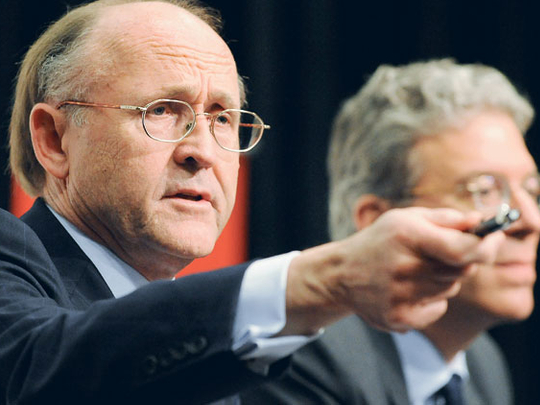
Melbourne: Rio Tinto Group, the world's third-largest mining company, said as much as half its balance sheet is threatened by Australia's plan to boost taxes on resources producers.
The complexity of the proposal for a 40 per cent super profits tax on resource companies makes it difficult to assess its costs precisely, Tom Albanese, Rio's chief executive officer, said in an interview broadcast on ABC's Inside Business. He said it may amount to more than 50 per cent.
"This is half our balance sheet at risk because we have someone now coming in to say, ‘I want to be your silent partner. I want 40 per cent of your pretax profits and largely written-off assets,'" Albanese said. The tax has damaged Australia's reputation overseas and added to sovereign risk, he said.
The government set aside A$38.5 million (Dh120 million) in its May 11 budget to promote an overhaul of the nation's tax system, including the resources levy.
Mining companies oppose the tax, scheduled to take effect in 2012, and have placed full-page advertisements in Australian newspapers to lobby for changes.
Last week, the government said it will run its own advertising campaign to counter the "misinformation." Treasurer Wayne Swan said in an emailed statement Saturday that the super profits tax, or RSPT, wouldn't be retroactive.
'Misleading' claims
"There has been much comment from mining companies in recent weeks about the supposed ‘retrospectivity' of the RSPT," Swan said.
"These claims are clearly misleading, as the RSPT will apply to mining profits from July 1 2012. It does not apply to past profits."
Rio's CEO said it was important to reconsider the proposal and that he's ready to work with Prime Minister Kevin Rudd's government on a fundamentally different approach. The world's third-largest mining company is already paying almost 35 per cent tax plus royalties, and will publish independently audited data on its tax payments this week, he said.
"Albanese left no doubt he's willing to engage on a long-term, workable solution, arguably a process companies like Rio should have been involved in before the tax was announced," said Tim Schroeders, a fund manager at Pengana Capital Ltd. in Melbourne.
Core elements
The government "won't back away" from the core elements of its proposal, Finance Minister Lindsay Tanner told Channel Ten's Meet the Press programme.
Still, Swan told parliament last week that the government was continuing to consult with industry as criticism of his administration's proposed advertising campaign mounted.
The Shadow Minister for Employment and Workplace Relations, Eric Abetz, called for a Senate inquiry into the government's handling of its advertising campaign.
"Labour is breaking its own guidelines in order to run a partisan political campaign," he said in a media release.
"This has all the stench of a desperate government facilitating false excuses to run a political campaign at taxpayers' expense."
The government's use of taxpayer money to get its message across is "a scandalous situation," billionaire businessman Clive Palmer said on Meet the Press.
The super-tax proposal itself is also hurting overseas investment and is likely to damage Australian jobs and livelihoods, he said.
'National interest'
Rudd told journalists in Melbourne May 29 that the campaign is in the national interest, while Tanner said Australia's economy could be harmed if misinformation about the tax went unanswered.
Wal King, the head of Leighton Holdings Ltd., Australia's biggest construction company, said builders are also worried about the tax, the Weekend Australian reported May 29.
He made the comments in a statement as president of the Australian Constructors Association, the newspaper said.
The mining-tax plan has prompted Rio Tinto to re-evaluate all its projects in Australia, Albanese said in the ABC interview.











